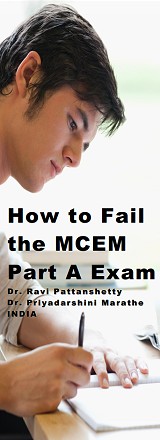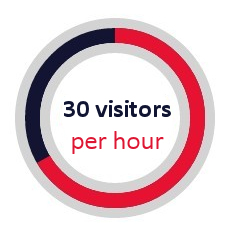EmergencyMedicine.in
EMinside
Favorites
Recommended
ATLS India - Advanced Trauma Life Support
 atls.in
atls.in 
American College of Emergency Physicians
 acep.org
acep.org
College of Emergency Medicine, United Kingdom
 rcem.ac.uk
rcem.ac.uk
Australasian College of Emergency Emergency Medicine
 acem.org.au
acem.org.au
 atls.in
atls.in 
American College of Emergency Physicians
 acep.org
acep.orgCollege of Emergency Medicine, United Kingdom
 rcem.ac.uk
rcem.ac.ukAustralasian College of Emergency Emergency Medicine
 acem.org.au
acem.org.auLet Others Know
Verified Site
Visitor Stats
AHA ECC 2010 Guidelines India Rollout
AHA ECC 2010 Guidelines India Rollout
07-Mar-2011
Editors Desk
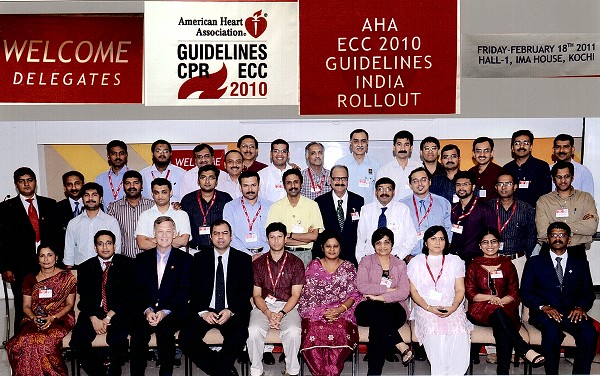 The American Heart Association (AHA) and Emergency Cardiovascular Care (ECC) 2010 Guidelines were officially rolled out in India at an AHA Instructor Update held at Kochi on 18 February 2011.
The American Heart Association (AHA) and Emergency Cardiovascular Care (ECC) 2010 Guidelines were officially rolled out in India at an AHA Instructor Update held at Kochi on 18 February 2011.
Senior faculty & instructors from all AHA International Training Centers (ITC) in India were present. The ITCs included Apollo Hyderabad, IIEMS Kottayam, SRMC Chennai, St. Johns Bangalore, Manipal University, Fortis Delhi, EMRI Hyderabad, Academy of Traumatology Ahmedabad, Maulana Azad Medical College Delhi and Phoenix Institute Delhi. We were also happy to notice that more than half of the instructors were working emergency medicine physicians from EM training institutes like Apollo, SRMC, MIMS and Fortis.
Laurence King, AHA Director for Asia Pacific Region, said that 13 million people were trained by AHA at 220 centers across the world. He said that the 17 ITCs in India (Click here for list of ITCs) with their faculty & instructors have supported AHA training. AHA had a massive plan to train 25 million people per year by the year 2015 and its reading material was available in 17 different languages.
Dr. Harper, an International Consultant of ECC, coordinated the rollout of Basic Life Support (BLS), Advanced Cardiac Life Support (ACLS) and Pediatric Advanced Life Support (PALS) courses. From March 1st, all AHA BLS, ACLS & PALS courses will teach the 2010 guidelines.He said that AHA recommendations were made with approval from the International Liaison Committee on Resuscitation (ILCOR) www.ilcor.org which consisted of resuscitation councils from US, Europe, Australia, New Zealand, South Africa and Asia. He questioned on why India did not have its own resuscitation council or was not on the Asian Resuscitation Council. He also said that India had unique opportunities for research in resuscitation science.
Dr. T. V. Ramakrishnan, Head of Emergency Medicine at Sri Ramachandra Medical College Chennai, who was among the instructor faculty, mentioned that the Society of Emergency Medicine India (SEMI) could form the resuscitation council in association with the Societies of Anesthesia and Critical Care.
Dr. George Abhraham, Founder of IIEMS which hosted the AHA Update, said that this was the first time all senior instructors from the Indian ITCs were physically present in one location. He said that, collectively, their single goal was to develop training programs and to standardize resuscitation training. And that this was best done with the AHA.
Dr. Joginder Solanki, an AHA international faculty and one of the organizers, told EmergencyMedicine.in that he aimed for organizing more AHA Updates, to promote interaction between the instructor faculties of Indian ITCs, and to create a resuscitation conference.
We know that SEMI had proposed the formation of a resuscitation council in early 2000 and with its return to the mainstream; the Indian Resuscitation Council could soon become a reality.
- EmergencyMedicine.in
.
07-Mar-2011
Editors Desk

 The American Heart Association (AHA) and Emergency Cardiovascular Care (ECC) 2010 Guidelines were officially rolled out in India at an AHA Instructor Update held at Kochi on 18 February 2011.
The American Heart Association (AHA) and Emergency Cardiovascular Care (ECC) 2010 Guidelines were officially rolled out in India at an AHA Instructor Update held at Kochi on 18 February 2011.Senior faculty & instructors from all AHA International Training Centers (ITC) in India were present. The ITCs included Apollo Hyderabad, IIEMS Kottayam, SRMC Chennai, St. Johns Bangalore, Manipal University, Fortis Delhi, EMRI Hyderabad, Academy of Traumatology Ahmedabad, Maulana Azad Medical College Delhi and Phoenix Institute Delhi. We were also happy to notice that more than half of the instructors were working emergency medicine physicians from EM training institutes like Apollo, SRMC, MIMS and Fortis.
Laurence King, AHA Director for Asia Pacific Region, said that 13 million people were trained by AHA at 220 centers across the world. He said that the 17 ITCs in India (Click here for list of ITCs) with their faculty & instructors have supported AHA training. AHA had a massive plan to train 25 million people per year by the year 2015 and its reading material was available in 17 different languages.
Dr. Harper, an International Consultant of ECC, coordinated the rollout of Basic Life Support (BLS), Advanced Cardiac Life Support (ACLS) and Pediatric Advanced Life Support (PALS) courses. From March 1st, all AHA BLS, ACLS & PALS courses will teach the 2010 guidelines.He said that AHA recommendations were made with approval from the International Liaison Committee on Resuscitation (ILCOR) www.ilcor.org which consisted of resuscitation councils from US, Europe, Australia, New Zealand, South Africa and Asia. He questioned on why India did not have its own resuscitation council or was not on the Asian Resuscitation Council. He also said that India had unique opportunities for research in resuscitation science.
Dr. T. V. Ramakrishnan, Head of Emergency Medicine at Sri Ramachandra Medical College Chennai, who was among the instructor faculty, mentioned that the Society of Emergency Medicine India (SEMI) could form the resuscitation council in association with the Societies of Anesthesia and Critical Care.
Dr. George Abhraham, Founder of IIEMS which hosted the AHA Update, said that this was the first time all senior instructors from the Indian ITCs were physically present in one location. He said that, collectively, their single goal was to develop training programs and to standardize resuscitation training. And that this was best done with the AHA.
Dr. Joginder Solanki, an AHA international faculty and one of the organizers, told EmergencyMedicine.in that he aimed for organizing more AHA Updates, to promote interaction between the instructor faculties of Indian ITCs, and to create a resuscitation conference.
We know that SEMI had proposed the formation of a resuscitation council in early 2000 and with its return to the mainstream; the Indian Resuscitation Council could soon become a reality.
- EmergencyMedicine.in
.
National Assembly on Pediatric Emergency Medicine (NAPEM) 2011
National Assembly on Pediatric Emergency Medicine (NAPEM) 2011
07-Mar-2011
Editors Desk
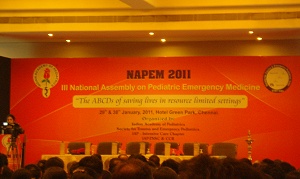 The 3rd National Assembly on Pediatric Emergency Medicine (NAPEM) was held at Chennai on 29-30 January 2011. This conference was organized by the Indian Academy of Pediatrics (IAP) and Indian Society of Trauma & Emergency Pediatrics (STEP).
The 3rd National Assembly on Pediatric Emergency Medicine (NAPEM) was held at Chennai on 29-30 January 2011. This conference was organized by the Indian Academy of Pediatrics (IAP) and Indian Society of Trauma & Emergency Pediatrics (STEP).
The preconference workshops included advanced pediatric trauma resuscitation, EM ultrasound and pediatric EM instructor training. In the conference, there were plenty of good talks on pediatric airway management and core pediatric EM. On the research side, there were posters as well as oral presentations. We were pleasantly surprised to see a high degree of EM awareness among the delegates.
A landmark talk, which summarized Indian Pediatric EM, was made by Dr. Suresh David, Professor and Head, Dept of Emergency Medicine at Christian Medical College, Vellore. He saluted NAPEM for breaking away from conventional pediatrics and forming a separate body for pediatric EM. This was similar to what the Society of Emergency Medicine India (SEMI) went through for adult EM in India.
Dr. David said that pitfalls in the existing system, which included ineffective emergency departments (ED), incompetent staffing and poor networking, have prevented the formation of chain of survival. He proposed the introduction of EM into undergraduate curriculum and to recognize EDs as teaching units. His NCERT study highlighted that there were only 4 medical colleges which had training programs in EM, for a country of over a billion people. He proposed starting MD (EM), DNB (EM), DNB (Pediatric EM) and Fellowship in Pediatric EM, as soon as possible. His dream for India was building a safety network of emergency care and pediatric emergency care.
Pediatric EM was recognized as a subspecialty by the Medical Council of India (MCI) in 2009 and the first seats are under Dr. MGR University in Tamil Nadu.
Pediatric EM is a relatively new specialty in India and it will take some time for hospitals & pediatric professionals to understand that dedicated pediatric emergency specialists should direct the resuscitation & treatment of seriously ill children.
EmergencyMedicine.in also salutes NAPEM !
.
07-Mar-2011
Editors Desk

 The 3rd National Assembly on Pediatric Emergency Medicine (NAPEM) was held at Chennai on 29-30 January 2011. This conference was organized by the Indian Academy of Pediatrics (IAP) and Indian Society of Trauma & Emergency Pediatrics (STEP).
The 3rd National Assembly on Pediatric Emergency Medicine (NAPEM) was held at Chennai on 29-30 January 2011. This conference was organized by the Indian Academy of Pediatrics (IAP) and Indian Society of Trauma & Emergency Pediatrics (STEP).The preconference workshops included advanced pediatric trauma resuscitation, EM ultrasound and pediatric EM instructor training. In the conference, there were plenty of good talks on pediatric airway management and core pediatric EM. On the research side, there were posters as well as oral presentations. We were pleasantly surprised to see a high degree of EM awareness among the delegates.
A landmark talk, which summarized Indian Pediatric EM, was made by Dr. Suresh David, Professor and Head, Dept of Emergency Medicine at Christian Medical College, Vellore. He saluted NAPEM for breaking away from conventional pediatrics and forming a separate body for pediatric EM. This was similar to what the Society of Emergency Medicine India (SEMI) went through for adult EM in India.
Dr. David said that pitfalls in the existing system, which included ineffective emergency departments (ED), incompetent staffing and poor networking, have prevented the formation of chain of survival. He proposed the introduction of EM into undergraduate curriculum and to recognize EDs as teaching units. His NCERT study highlighted that there were only 4 medical colleges which had training programs in EM, for a country of over a billion people. He proposed starting MD (EM), DNB (EM), DNB (Pediatric EM) and Fellowship in Pediatric EM, as soon as possible. His dream for India was building a safety network of emergency care and pediatric emergency care.
Pediatric EM was recognized as a subspecialty by the Medical Council of India (MCI) in 2009 and the first seats are under Dr. MGR University in Tamil Nadu.
Pediatric EM is a relatively new specialty in India and it will take some time for hospitals & pediatric professionals to understand that dedicated pediatric emergency specialists should direct the resuscitation & treatment of seriously ill children.
EmergencyMedicine.in also salutes NAPEM !
.
Revival of Society of Emergency Medicine India
Revival of Society of Emergency Medicine India
06-Mar-2011
Editors Desk
The Society of Emergency Medicine India (SEMI), in a meeting held at Apollo Hyderabad on 23rd January, outlined strong steps to revive SEMI activites and restore it to its former glory. The meeting followed the conclusion of the Apollo EMPACT workshop.

Image 1 - Dr. Hariprasad, CEO - Apollo Hospitals Hyderabad and Founding member & Chairman of SEMI, addressing the audience at Apollo EMPACT. Sitting are the various faculty members from Apollo emergency departments.
The SEMI is the oldest and the first Indian organization created for the development of emergency medicine (EM) in India. It was formed way back in 1999 with its first meeting conducted at EMCON 1999, the first Indian National Conference in EM (Click here for EMCON list). SEMI was responsible for the accreditation & the spread of the first academic courses in EM (1 year Fellowship in EM) from the year 2000 onwards. These academic courses were started by private institutes & hospitals because the concept of EM was non-existent in the public sector. In fact in the year 2000, SEMI wrote to the Medical Council of India (MCI) and the Diplomate National Board (DNB) for the recognition of EM as a specialty and for its inclusion into the undergraduate & postgraduate curriculum. Click here to read our earlier article
SEMI had remained a formidable body of Indian emergency physicians for several years. And SEMI is the only organisation representing India on the International Federation of Emergency Medicine (IFEM) www.ifem.cc
As with most of Indian societies, SEMI was plagued by internal issues, which led to most of the veterans choosing to remain disconnected since the last few years.
With the new office bearers elected in 2010, led by SEMI President Dr. V. P. Chandrasekaran, Head of EM, from Vinayaka Missions University, Salem, the whole organization is set to change. His team and Dr. Chandrasekaran outlined concrete measures for its revival and promised sustained support for the development of EM in India, especially the academic growth. Dr. Chandrasekaran also addressed the audience & faculty at Apollo EMPACT.
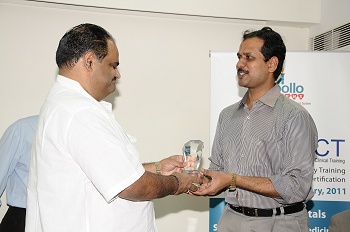
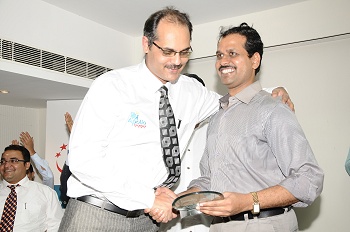
Image 2 - Dr. V. P. Chandrasekaran, President of SEMI receives a memento for his leadership in Indian EM, from Dr. Hariprasad.
Image 3 - Dr. V. P. Chandrasekaran hands over a faculty memento to Dr. Mahesh Joshi.
Dr. Chandrasekaran, in one of his first moves, appointed Dr. Hariprasad, CEO of Apollo Hospitals Hyderabad and Dr. Mahesh Joshi, Director Emergency Medicine, Apollo Hospitals Group, as Chairman and Co-Chairman of SEMI, respectively. Dr. Hariprasad is one of the pioneers of EM in India and a founding member of SEMI.
We will be watching SEMI closely for the next few months to see whether promises are delivered. One thing is sure that both Apollo and SEMI are the among the oldest and experienced organizations within the Indian EM community. With interests aligned by Dr. Chandrasekaran, their synergism is likely to lead the next level of development in Indian EM.
- EmergencyMedicine.in
Click here to go to SEMI website (www.semi.org.in)
Copyright ©2011 EmergencyMedicine.in All Rights Reserved.
Unauthorized copying or reproduction of this article is prohibited without written authorization.
.
06-Mar-2011
Editors Desk

The Society of Emergency Medicine India (SEMI), in a meeting held at Apollo Hyderabad on 23rd January, outlined strong steps to revive SEMI activites and restore it to its former glory. The meeting followed the conclusion of the Apollo EMPACT workshop.

Image 1 - Dr. Hariprasad, CEO - Apollo Hospitals Hyderabad and Founding member & Chairman of SEMI, addressing the audience at Apollo EMPACT. Sitting are the various faculty members from Apollo emergency departments.
The SEMI is the oldest and the first Indian organization created for the development of emergency medicine (EM) in India. It was formed way back in 1999 with its first meeting conducted at EMCON 1999, the first Indian National Conference in EM (Click here for EMCON list). SEMI was responsible for the accreditation & the spread of the first academic courses in EM (1 year Fellowship in EM) from the year 2000 onwards. These academic courses were started by private institutes & hospitals because the concept of EM was non-existent in the public sector. In fact in the year 2000, SEMI wrote to the Medical Council of India (MCI) and the Diplomate National Board (DNB) for the recognition of EM as a specialty and for its inclusion into the undergraduate & postgraduate curriculum. Click here to read our earlier article
SEMI had remained a formidable body of Indian emergency physicians for several years. And SEMI is the only organisation representing India on the International Federation of Emergency Medicine (IFEM) www.ifem.cc
As with most of Indian societies, SEMI was plagued by internal issues, which led to most of the veterans choosing to remain disconnected since the last few years.
With the new office bearers elected in 2010, led by SEMI President Dr. V. P. Chandrasekaran, Head of EM, from Vinayaka Missions University, Salem, the whole organization is set to change. His team and Dr. Chandrasekaran outlined concrete measures for its revival and promised sustained support for the development of EM in India, especially the academic growth. Dr. Chandrasekaran also addressed the audience & faculty at Apollo EMPACT.


Image 2 - Dr. V. P. Chandrasekaran, President of SEMI receives a memento for his leadership in Indian EM, from Dr. Hariprasad.
Image 3 - Dr. V. P. Chandrasekaran hands over a faculty memento to Dr. Mahesh Joshi.
Dr. Chandrasekaran, in one of his first moves, appointed Dr. Hariprasad, CEO of Apollo Hospitals Hyderabad and Dr. Mahesh Joshi, Director Emergency Medicine, Apollo Hospitals Group, as Chairman and Co-Chairman of SEMI, respectively. Dr. Hariprasad is one of the pioneers of EM in India and a founding member of SEMI.
We will be watching SEMI closely for the next few months to see whether promises are delivered. One thing is sure that both Apollo and SEMI are the among the oldest and experienced organizations within the Indian EM community. With interests aligned by Dr. Chandrasekaran, their synergism is likely to lead the next level of development in Indian EM.
- EmergencyMedicine.in
Click here to go to SEMI website (www.semi.org.in)
Unauthorized copying or reproduction of this article is prohibited without written authorization.
.
Apollo EMPACT 2011
Apollo EMPACT 2011
06-Mar-2011
Editors Desk
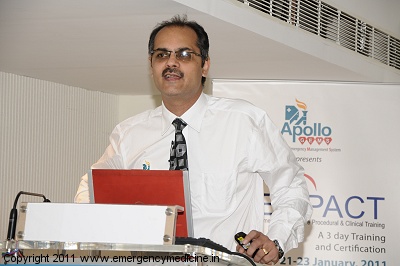 Apollo conducted its first Emergency Medicine Procedural and Clincal Training (EMPACT) workshop, at Apollo Health City Hyderabad, on 21-23 January 2011.
Apollo conducted its first Emergency Medicine Procedural and Clincal Training (EMPACT) workshop, at Apollo Health City Hyderabad, on 21-23 January 2011.
Apollo Hyderabad has been a pioneer of EM growth in India since 1999, developing the full spectrum of emergency medicine (EM), ranging from clinical patient care, EMS, emergency departments (ED), EM educational programs, lifesupport training, research, medical simulation, EM ultrasound, disaster management, ED administration and telemedicine.
Apollo EMPACT was a 3-day workshop for 110 doctors, with resuscitation & emergency clincal procedures on Day 1, core EM lectures & simulation on Day 2, and basic EM ultrasonography skills taught on Day 3.
Image 1 - Dr. Mahesh Joshi, Director for Emergency Medicine - Apollo Hospitals Group, addressed doctors on the importance of emergency medicine specialty and gave an overview of resuscitation. Dr. Mahesh Joshi is a honorary recipient of the Fellowship of College of Emergency Medicine (FCEM) United Kingdom, in 2010.
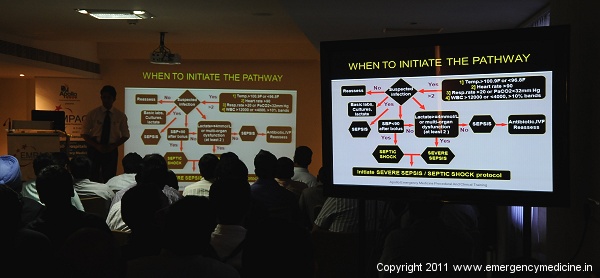
Image 2 - Lecture on Early Goal Directed Therapy in Sepsis, at Apollo EMPACT
What we particularly liked about this training is that the 90% of the teaching faculty were residency trained in EM (within India), qualified in EM (MCEM/FCEM), and working fulltime in EM (in Apollo EDs). The talks on Resuscitation overview, Trauma, Sepsis & Stroke were good and relevant to daily work in EM. Apollo also had created their closed pool of teachers from their own EDs, which was evident from the Apollo GEMS (Group Emergency Management System) shirts the entire faculty was wearing. Both EMPACT & GEMS were a part of a larger initiative of Apollo for EM in India.
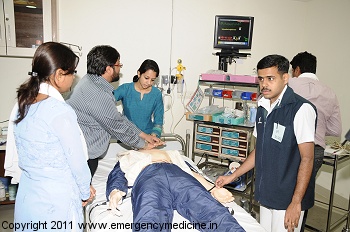
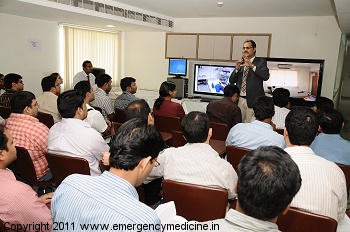
Image 3 - A team of doctors & nurse attempt resuscitation on a high fidelity manikin in a simulated emergency room. The live video from the room was visible to the entire audience.
Image 4 - Simulation instructors debriefed on the performance of doctors after each simulation scenario.
The simulation workshop on Day 2 was the first time many doctors were exposed to the concept of medical simulation. And this was the first time in India that a medical simulation workshop has been conducted at this scale, despite more than 18 Indian institutes having medical simulation equipment.
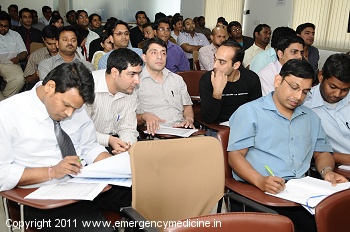
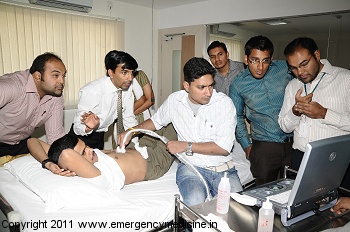
Image 5 - The audience consisted largely of working EM residents, along with a few interns & academic trainers.
Image 6 - Doctors getting a hands-on experience on basic EM ultrasonography. A few of them got to handle the cellphone-sized V-Scan portable ultrasound machine.
We strongly believe that EM cannot be learnt from doctors of any other specialty, unless they have worked full time, under supervision, in a well established EM department. With the cropping up of multiple questionable EM related courses & their self-declared course directors, all over the country (both Govt & private), Apollo EMPACT workshops are set to be one of the best learning opportunities for the any EM resident working in India.
- EmergencyMedicine.in
Disclaimer - EmergencyMedicine.in was one of the sponsors for Apollo EMPACT Jan 2011
Copyright ©2011 EmergencyMedicine.in All Rights Reserved.
Unauthorized copying or reproduction of this article is prohibited without written authorization.
.
06-Mar-2011
Editors Desk

 Apollo conducted its first Emergency Medicine Procedural and Clincal Training (EMPACT) workshop, at Apollo Health City Hyderabad, on 21-23 January 2011.
Apollo conducted its first Emergency Medicine Procedural and Clincal Training (EMPACT) workshop, at Apollo Health City Hyderabad, on 21-23 January 2011. Apollo Hyderabad has been a pioneer of EM growth in India since 1999, developing the full spectrum of emergency medicine (EM), ranging from clinical patient care, EMS, emergency departments (ED), EM educational programs, lifesupport training, research, medical simulation, EM ultrasound, disaster management, ED administration and telemedicine.
Apollo EMPACT was a 3-day workshop for 110 doctors, with resuscitation & emergency clincal procedures on Day 1, core EM lectures & simulation on Day 2, and basic EM ultrasonography skills taught on Day 3.
Image 1 - Dr. Mahesh Joshi, Director for Emergency Medicine - Apollo Hospitals Group, addressed doctors on the importance of emergency medicine specialty and gave an overview of resuscitation. Dr. Mahesh Joshi is a honorary recipient of the Fellowship of College of Emergency Medicine (FCEM) United Kingdom, in 2010.

Image 2 - Lecture on Early Goal Directed Therapy in Sepsis, at Apollo EMPACT
What we particularly liked about this training is that the 90% of the teaching faculty were residency trained in EM (within India), qualified in EM (MCEM/FCEM), and working fulltime in EM (in Apollo EDs). The talks on Resuscitation overview, Trauma, Sepsis & Stroke were good and relevant to daily work in EM. Apollo also had created their closed pool of teachers from their own EDs, which was evident from the Apollo GEMS (Group Emergency Management System) shirts the entire faculty was wearing. Both EMPACT & GEMS were a part of a larger initiative of Apollo for EM in India.


Image 3 - A team of doctors & nurse attempt resuscitation on a high fidelity manikin in a simulated emergency room. The live video from the room was visible to the entire audience.
Image 4 - Simulation instructors debriefed on the performance of doctors after each simulation scenario.
The simulation workshop on Day 2 was the first time many doctors were exposed to the concept of medical simulation. And this was the first time in India that a medical simulation workshop has been conducted at this scale, despite more than 18 Indian institutes having medical simulation equipment.


Image 5 - The audience consisted largely of working EM residents, along with a few interns & academic trainers.
Image 6 - Doctors getting a hands-on experience on basic EM ultrasonography. A few of them got to handle the cellphone-sized V-Scan portable ultrasound machine.
We strongly believe that EM cannot be learnt from doctors of any other specialty, unless they have worked full time, under supervision, in a well established EM department. With the cropping up of multiple questionable EM related courses & their self-declared course directors, all over the country (both Govt & private), Apollo EMPACT workshops are set to be one of the best learning opportunities for the any EM resident working in India.
- EmergencyMedicine.in
Disclaimer - EmergencyMedicine.in was one of the sponsors for Apollo EMPACT Jan 2011
Unauthorized copying or reproduction of this article is prohibited without written authorization.
.
2011 Indian Emergency Medicine starts off with a Bang
2011 Indian Emergency Medicine starts off with a Bang
06-Mar-2011
Editors Desk

Emergency medicine (EM) in India started off with a loud bang in 2011. The last two months saw several important events, which highlighted the presence of an educated EM community in the country. A brief overview of each event is presented in the news articles which follow above.
.
06-Mar-2011
Editors Desk


Emergency medicine (EM) in India started off with a loud bang in 2011. The last two months saw several important events, which highlighted the presence of an educated EM community in the country. A brief overview of each event is presented in the news articles which follow above.
.


